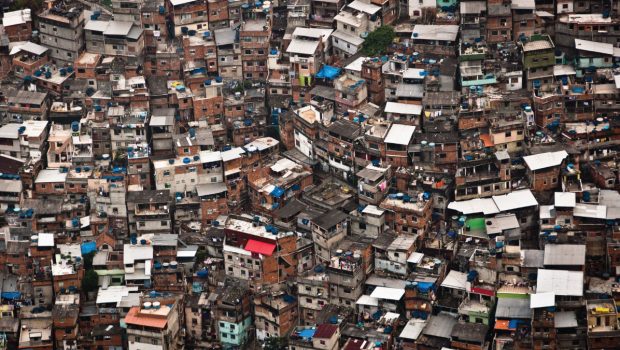Promoting use of technology to tackle urban problems
More developing countries could use satellites and other technologies to solve urban sustainability challenges, such as providing water to a growing population.
© Shutterstock/Donatas Dabravolskas | Favela da Rocinha, the biggest slum in Brazil.
More than half of the world’s population live in urban areas. By 2050, that figure is expected to rise to 6.5 billion people – two thirds of all humanity.
The COVID-19 pandemic has exacerbated the sustainability challenges facing urban areas. For instance, the use of masks and other disposable plastics has significantly increased urban plastic pollution and inappropriate waste management practices.
But rapid technological change opens new possibilities for innovatively addressing urban problems, at a lower cost and more sustainably.
The 25th session of the UN Commission on Science and Technology for Development (CSTD) slated for 28 March to 1 April in Geneva and online will examine how to leverage science, technology and innovation for sustainable urban development in a post-pandemic world, among other topics. UNCTAD serves as the CSTD secretariat.
Satellites hold promise
Satellites are among the technologies that hold promise for tackling urban sustainability challenges.
“Urban development issues such as planning and the control of new population settlements can be addressed through satellites,” said Miguel Bello Mora, one of the experts who will speak at the event.
“By facilitating urban planning, satellites help ensure basic services such as water supply, energy or garbage collection are provided,” said Mr. Mora, the CEO of the AIR Centre, an intergovernmental organization that helps countries use technologies to promote development.
He said satellites help authorities in urban areas identify vulnerability to natural hazards such as flooding, sea level rise, large fires, volcanic eruptions and tsunamis.
They also provide data to mitigate the impact of these disasters by giving a synoptic view of affected areas, helping relief teams identify worst-hit areas and paths to reach and support victims.
Satellites also monitor air quality in urban areas. “This is a serious problem in many African cities, where poor air quality causes many deaths,” Mr. Mora said.
Besides, authorities use satellites to monitor city water resources, identify periods of water scarcity and assess whether the water is suitable for human consumption.
Supporting developing countries
UNCTAD is seeking to work with the AIR Centre to help more developing countries use satellites to address these issues and tackle urban sustainability challenges.
Developing countries can leverage technology to make progress towards sustainability goals for urban development by using data provided by satellites combined with artificial intelligence algorithms and big data.
The majority of the more than 1 billion slum dwellers in the world live in developing countries, especially in Africa and Asia, where they face numerous challenges.
A report of the UN Secretary-General prepared for the commission identifies key urban sustainability challenges in relation to energy, circularity, water, mobility, economic prosperity, housing, gender-related empowerment and equality, urban planning, safety and security and protection from natural disasters.
Seize the innovation momentum
UNCTAD’s director of technology and logistics, Shamika N. Sirimanne, said the COVID-19 pandemic has shown the importance of science, technology and innovation in ensuring the resilience of urban systems.
“Science, innovations and the adoption of digital technologies have helped economies and societies continue functioning during the crisis,” she said.
She urged further action at the national and international levels to seize the innovation momentum from the pandemic and use the transformative power of science, technology and innovation to deliver on the commitment to sustainable urban development.
Sustainable Development Goal 11 seeks to enhance inclusive and sustainable urbanization in all countries by 2030, among other targets.
Ms. Sirimanne said meeting the goal would require more international cooperation efforts to further pool, formalize and transfer available knowledge of effective science, technology and innovation solutions.








Gloss